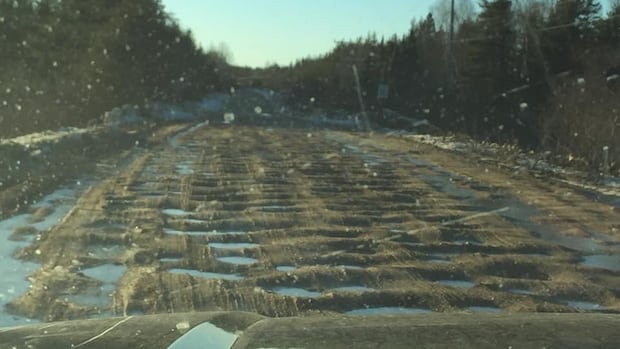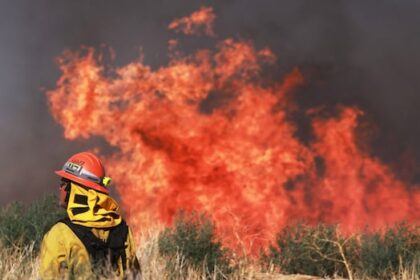MontrealThe Atikamekw council of Manawan initiated legal action against Quebec’s Transport Ministry for failing to carry out the necessary repairs on the one road that connects the community to the rest of the province.’Rebuilding the Manawan road will be a real act of reconciliation,’ says Manawan chiefRachel Watts · CBC News · Posted: Oct 08, 2025 4:00 AM EDT | Last Updated: October 8Residents describe the Manawan road as narrow, winding and riddled with potholes. A photo from 2019 shows the road conditions on one stretch. (Submitted by the Conseil des Atikamekw de Manawan)Chief Sipi Flamand describes the only road in and out of the Atikamekw community of Manawan as a “failure of the state.”The 87-kilometre accident-prone stretch — located in the Lanaudière region, 250 kilometres north of Montreal — is narrow, winding, riddled with potholes and poorly maintained, he says.He goes as far as calling it the “road from hell.”On Sept. 30, which was also National Day for Truth and Reconciliation, the Atikamekw council of Manawan initiated legal action against Quebec’s Transport Ministry for failing to carry out the necessary repairs and compromising access to essential services, including health care.The council filed an application for a judicial review with the Superior Court of Quebec, says Flamand.In a news release Tuesday, the council says the ministry has an obligation to ensure repair and maintenance of roads for which it is responsible.It argues the government’s inaction infringes on statutory obligations and the constitutional rights of the community.An ambulance veered off the road in a photo from September 2019. (Submitted by the Conseil des Atikamekw de Manawan)”A road that kills is not a road,” said Flamand, adding that about 100 logging trucks circulate on the road every day in addition to local traffic.”Nothing has been done for us. We have been hearing about planning for years, it has become a word used to delay action.”The council issued a 30-day ultimatum in August but it was ignored by the government, says Flamand — proof to him that the time for discussion is now over.”They don’t want to hear us and it’s really problematic,” he said.’We have the right to exist in our home,’ says residentJolianne Ottawa uses the road at least three times a week.The 87-kilometre stretch could take up to two hours to drive when the road conditions are bad, she says.A Manawan resident and consultant in governance and management, Ottawa is the former director of health services at the Masko-Siwin health centre.Working as a nurse for years in her community, she says the road conditions caused terrible challenges.”I’ve had patients with fractures. It’s inhumane to make them go on the road,” she said.”We have the right to exist in our home.”Despite having “every reason in the world” to leave the community, she says residents are still staying and fighting for accessibility.On Tuesday, the Transport Minister told reporters the file was before the courts and would not comment further. The Transport Ministry did not respond to CBC’s email request for comment before publication. The office of Ian Lafrenière, Quebec’s public security minister and minister responsible for relations with the First Nations and Inuit, refused to comment on the matter.Road is ‘our only lifeline,’ says chiefIn the news release from the council issued Tuesday, it says the road impacts residents’ quality of life but also harms medical access — worsening the delays in ambulances.In 2022, a coroner’s report looking into the death of a seven-month-old baby from Manawan said significant delays in receiving medical care likely played a role in the girl’s death.Coroner Géhane Kamel made three recommendations, including implementing medical evacuation services by helicopter for patients in critical condition in remote regions.Sipi Flamand, vice-chief of the Manawan Band Council, said turning to the United Nations might not have been necessary if the provincial government had adopted Joyce’s Principle. (Submitted by Sipi Flamand)Chief Flamand says the council decided to file this legal action out of a sense of duty to the residents.”This route is not optional. It’s our only lifeline connecting our community,” he said.He says construction would not only save lives but also prove the province “is serious about its commitments.””When we talk about reconciliation, it’s not only a symbolic word, it’s … taking concrete action on structural injustice,” he said.”And rebuilding the Manawan road will be a real act of reconciliation.”ABOUT THE AUTHORRachel Watts is a journalist with CBC News in Quebec City. Originally from Montreal, she enjoys covering stories in the province of Quebec. You can reach her at rachel.watts@cbc.ca.Follow Rachel on TwitterWith files from CBC’s Breakaway and Cathy Senay
Thursday, 5 Mar 2026
Canada – The Illusion
Search
Have an existing account?
Sign In
© 2022 Foxiz News Network. Ruby Design Company. All Rights Reserved.
You May also Like
- More News:
- history
- Standing Bear Network
- John Gonzalez
- ᐊᔭᐦᑊ ayahp — It happened
- Creation
- Beneath the Water
- Olympic gold medal
- Jim Thorpe
- type O blood
- the bringer of life
- Raven
- Wás’agi
- NoiseCat
- 'Sugarcane'
- The rivers still sing
- ᑲᓂᐸᐏᐟ ᒪᐢᑿ
- ᐅᑳᐤ okâw — We remember
- ᐊᓂᓈᐯᐃᐧᐣ aninâpêwin — Truth
- This is what it means to be human.
- Nokoma











